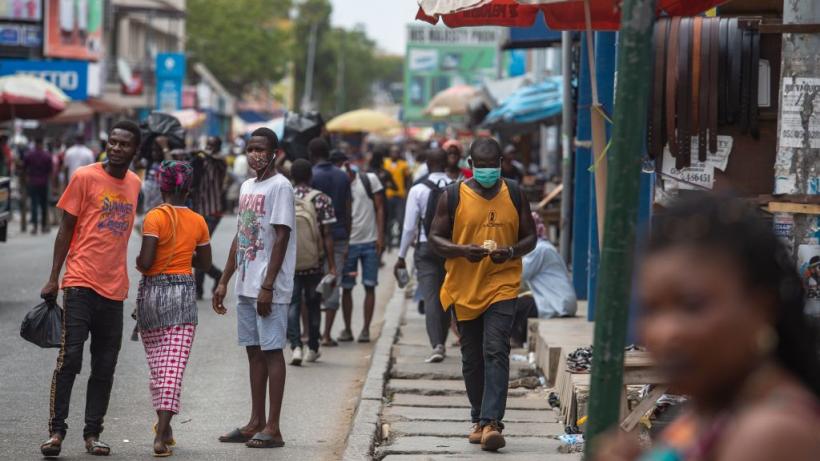
New study shows pandemic’s toll on jobs, businesses, and food security in developing countries
The onset of the COVID-19 pandemic caused a sharp decline in living standards and rising food insecurity in developing countries across the globe, according to a new study by an international team of economists that includes researchers from LSE’s International Growth Centre (IGC).
The study, published 5 February in the journal Science Advances, provides an in-depth view of the health crisis’s initial socioeconomic effects in low- and middle-income countries, using detailed micro data collected from tens of thousands of households across nine countries. The phone surveys were conducted from April through July 2020 of nationally and sub-nationally representative samples in Bangladesh, Burkina Faso, Colombia, Ghana, Kenya, Nepal, Philippines, Rwanda, and Sierra Leone. Across the board, study participants reported drops in employment, income, and access to markets and services, translating into high levels of food insecurity. Many households reported being unable to meet basic nutritional needs.
“COVID-19 and its economic shock present a stark threat to residents of low- and middle-income countries — where most of the world’s population resides — which lack the social safety nets that exist in rich countries,” said economist Susan Athey, of Stanford University’s Graduate School of Business. “The evidence we’ve collected show dire economic consequences, including rising food insecurity and falling income, which, if left unchecked, could thrust millions of vulnerable households into poverty.”
Across the 16 surveys, the percentage of respondents reporting losses in income ranged from 8% in Kenya to 86% in Colombia. The median, or midpoint of the range, was a staggering 70%. The percentage reporting loss of employment ranged from 6% in Sierra Leone to 51% in Colombia with a median of 29%.
Significant percentages of respondents across the surveys reported being forced to miss meals or reduce portion sizes, including 48% of rural Kenyan households, 69% of landless, agricultural households in Bangladesh, and 87% of rural households in Sierra Leone — the highest level of food insecurity. Poorer households generally reported higher rates of food insecurity, though rates were substantial even among the better off. The steep rise in food insecurity reported among children was particularly alarming given the potentially large negative long-run effects of under-nutrition on outcomes later in life, according to the study.
Survey results from Bangladesh and Nepal suggest that levels of food insecurity were far higher during the pandemic than during the same season in previous years.
In most countries, a large share of respondents reported reduced access to markets, consistent with lockdowns and other restrictions on mobility implemented between March and June 2020 to contain the spread of the virus. The amount of social support available to respondents from governments or non-governmental organisations varied widely across the surveys, but the high rates of food insecurity reported suggest that support was insufficient even when present, the researchers state.
“Sierra Leone and many other African countries are currently facing worrying rises in COVID-19 cases. At the end of January, the Government of Sierra Leone reinstated a curfew and began restricting movement between districts to essential workers only,” said Niccolo Meriggi, Country Economist for IGC Sierra Leone. “We have been tracking key economic and social indicators throughout the crisis. This vital data can help inform containment measures to limit the harsh economic toll they can have on households and businesses.”
The study shows that in addition to increasing food insecurity, the pandemic and accompanying containment measures have undermined several other aspects of household wellbeing. Schools in all sample countries were closed during most or all of the survey period. Respondents also reported reduced access to health services, including prenatal care and vaccinations. Combined, these factors could be particularly damaging to children in the long run, the researchers note.
Current circumstances may call for social protection programmes that prioritise addressing immediate poverty and under-nutrition before tackling deeper underlying causes, the researchers state. They suggest policymakers consider identifying poor households using mobile phones and satellite data and then provide them mobile cash transfers. The researchers also recommend providing support for basic utilities, such as water and electricity, through subsidies and by removing penalties for unpaid bills. They note a fundamental link between containing COVID-19 and providing economic relief as households facing acute shortages may be less willing than others to follow social distancing rules so that they can find opportunities to meet basic needs.
Mushfiq Mobarak, IGC Lead Academic for Bangladesh; Christopher Udry, IGC Lead Academic for Ghana; and Niccolo Meriggi, Country Economist for IGC Sierra Leone, are among the team of researchers who worked on this study.
Researchers on the study also represent the following institutions: University of California, Berkeley and the Center for Effective Global Action; The World Bank; Innovations for Poverty Action; University of California, Davis; Northwestern University, Global Poverty Lab and the Kellogg School of Management; Yale University and Y-RISE; University of Basel, Switzerland; Princeton University; Busara Center for Behavioral Economics, Nairobi, Kenya; Stanford University; WZB Berlin Social Science Center; Columbia University; Vyxer Remit Kenya, Busia, Kenya; American University; University of Goettingen, Germany; Harvard University; and Wageningen University, Netherlands.
Contact information:
Emilie Yam, Head of Communications, IGC
Email: [email protected] Phone: +44 (0)7804 906 778

